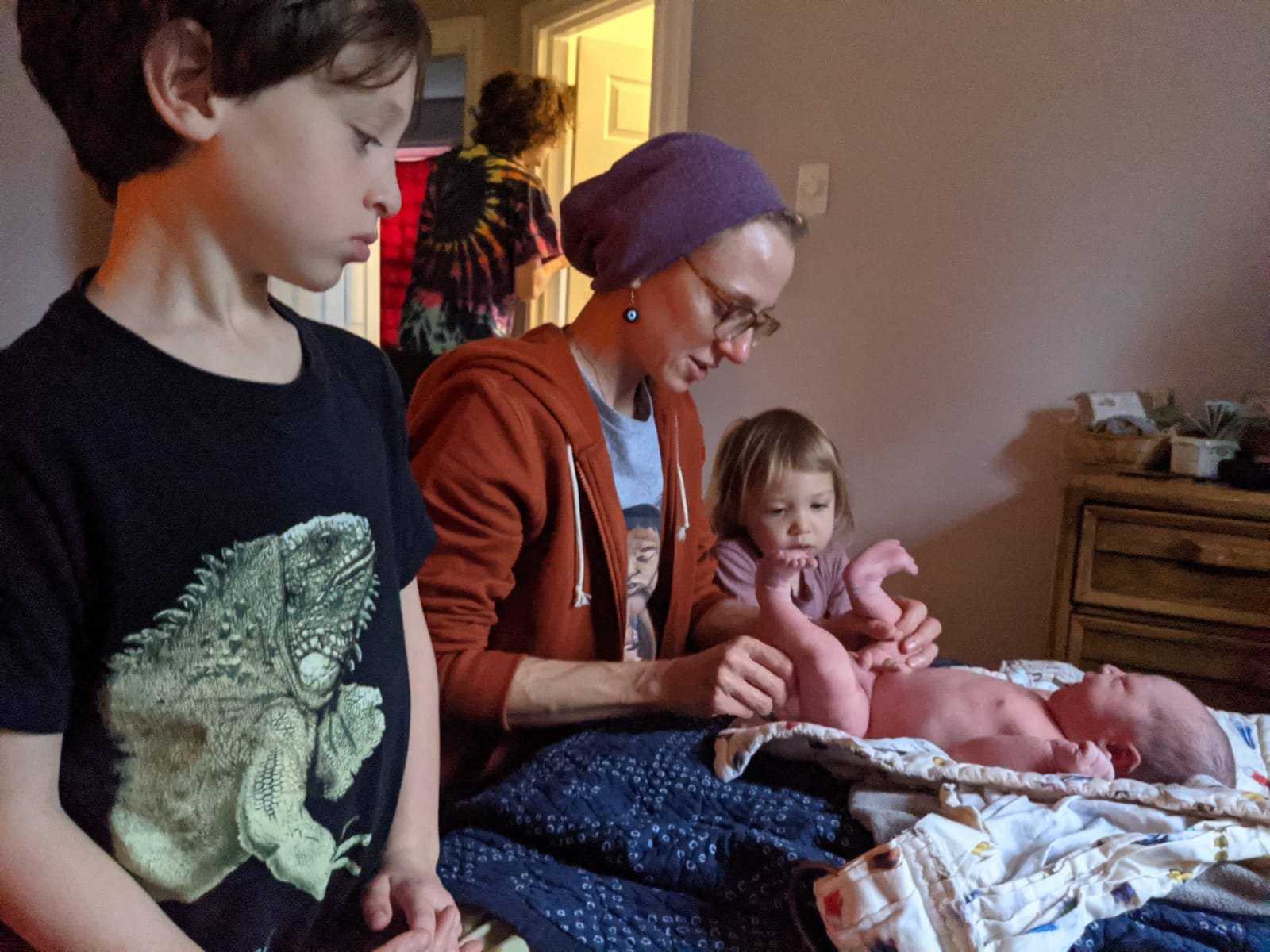Midwifery Care
Why homebirth? Because you feel confident in your ability to birth. Because you're healthy, not sick. Because birth is normal. Because you want to know who will attend your birth. Because you feel safe at home. Because you don't want surgery. Because you want more than one or two people present at the birth, and your kids, too. Because maybe you've done it before and you know you can do it. Because you've done it before and know that you deserved better. Because you want trauma-informed care. Because you want to birth in water. Because your partner wants to catch the baby. Because your dog is a great doula.
The 2014 MANA report on planned homebirths supported by a certified professional midwife showed excellent outcomes for babies, including that 97% of babies were carried to full-term (compared to about 90% for the U.S. population as a whole). Parents had low rates of medical intervention (4.5% received pitocin and/or an epidural), and an overall cesarean rate of 5.7%, compared to the national rate of 31%.
Photo by Hayden Trace
I follow the midwifery model of care, in which birth is a normal thing that the body does. My role is to support normal. You receive complete continuity of care, not only meaning that you know who will support you in birth, but we will have the opportunity to develop a relationship—I get to know you and what’s important to you, and you feel comfortable knowing me when I walk through your door and into one of the most vulnerable experiences of your life. You also receive exceptional postpartum care, with close provider contact and frequent visits during the first two weeks postpartum.
Midwives care for folks who take personal responsibility for their wellness, including eating nourishing foods, moving their bodies, and managing stress. Home birthing parents expect exceptional care, but they don't expect their provider to make all the choices. They want information about the options available to them and seek out care that minimizes technological interventions, recognizing the negative impact of routine intervention on childbirth in America.
Questions? Check out the homebirth FAQ!
Prenatal Care
- We see each other monthly until 28 weeks; bi-weekly appointments from 28-36 weeks; and weekly appointments after 36 weeks. Most of the 60-90 minute sppointment is spent in conversation, and by the time you give birth we've had plenty of time to get to know each other well. The clinical portion includes an assessment of your vitals, your baby's growth and heart rate, and occasional labwork.
- I offer all the routine lab work that would be required in a medical setting, as well as any other additional lab work you might want or need. I can refer you to a radiology department for ultrasound. Depending on your insurance, there may be additional fees associated with lab work and ultrasound.
- I provide extensive nutritional, herbal and lifestyle counseling for a healthy pregnancy and for common pregnancy and postpartum challenges. This includes plenty of resources for you to explore outside of appointments.
Labor & Birth
- You're supported by myself and a birth assistant in active labor until 3-5 hours postpartum.
- My role is to hold space for a safe experience. I check your baby's heart rate using a hand-held doppler, and keep track of your vitals.
- After connecting with your new baby, I provide a newborn exam to assess your baby's wellness.
- I encourage breast/chestfeeding and will support you in getting a good latch.
Postpartum Care
- Home visits at around 24 hours postpartum, additional visits in the first week postpartum, then at two weeks and six weeks postpartum, and as needed, assessing both parent and newborn wellness.
- Newborn metabolic screening ("PKU test") and lab work as desired or needed.
- Breast/chestfeeding support is provided to ensure that the first few weeks go as smoothly as possible. I may identify challenges that require consultation from a lactation professional.
- We will discuss healthy and supportive foods and herbs for the postpartum.
- I provide Wellness Care as desired at your 6 week postpartum, which can include a Pap smear.
Miscarriage Support
- I offer counseling on miscarriage options, including options for expectant management.
- In-person support for miscarriage and postpartum care
- Lab work as needed or desired
- Lactation options and support
- Read more about miscarriage support
“It’s impossible to thank you enough for the amazing support you provided during our pregnancy and birth. Our experience would not have been as extraordinary, transformative, or filled with as much love and security if you had not been a part of it. From the moment we met you, we felt an instant connection thanks to your warmth, caring, and wisdom. It was truly a privilege to learn from you each visit and to get to know you, and a special joy that you helped deliver our baby.”



